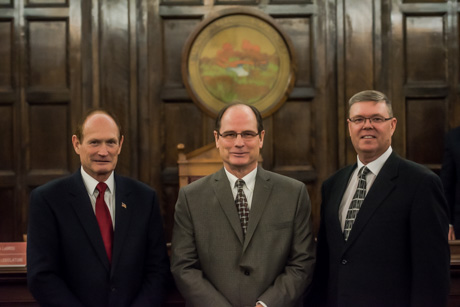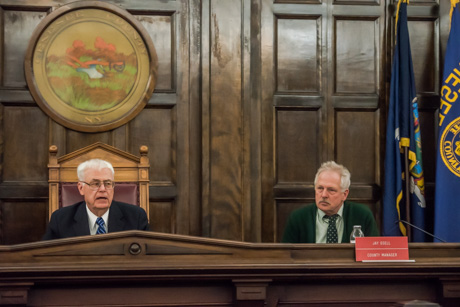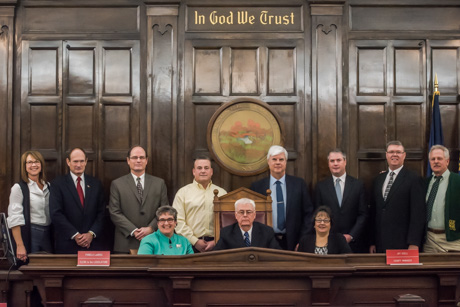The Genesee County Legislature is having a hard time coming to terms with borrowing $4 million to potentially save $4 million or more on future energy bills.
Not every member of the Legislature believes the cost savings are real, or that the county should borrow that much money on an expectation of saving money years from now.
Legislators Gary Maha and Andrew Young are the most skeptical.
"I appreciate the effort," Young said. "I try to look at everything just as I would for my business. Would I do it? I would not borrow $4 million and hope I got it back over the next 20 years. I don’t know too many business people who would."
He called the idea, from a business perspective, "irrational."
Clattenburg said she looked at it a little differently.
"The rationale is like any homeowner," Clattenburg said. "You buy an energy-efficient furnace and your costs are cut in half and you take saving from the energy cost and use it to pay for your furnace. You talk about (as) if, I was a business. I talk about it as if I were a housewife and I was buying a furnace. That is how I would look at it."
In summary, the proposal involves the county signing an agreement with Johnson Controls that would entail the county borrowing $4 million. Johnson Controls would then act as a contractor for a series of projects intended to reduce energy consumption at county buildings.
Many of the projects are already part of the county's capital investment plans. Over the 20 years, the county would pay $200,000 a year on the loan but save an estimated $200,000 a year in energy costs. Johnson Controls guarantees a certain amount of costs savings realized in each of the first three years of the contract. The county could buy a sort of extended warranty for additional years to guarantee savings, though that isn't really being considered.
County Highway Superintendent Tim Hens first brought the idea to the Legislature in February and the Legislature gave him the green light to put together a resolution to approve a contract with Johnson Controls.
He's been to two committee meetings this week, Public Service on Monday and Ways and Means on Wednesday, to discuss the proposal with legislators. Neither committee has yet to approve the resolutions.
Yesterday, Ways and Means tabled the resolution pending more information on other financing options, such as using $2 million the county has available and borrowing only $2 million, perhaps from another source.
“I don’t just see it as a loser," Hens said during a 30-minute robust discussion of the proposal Wednesday. "I think it’s a good deal for the county. I wouldn’t be here for my third committee meeting pushing it so heavily if I didn’t think it was a great idea for the county.”
The benefits as laid out by Hens, County Treasurer Scott German, and the legislators who support it -- Shelly Stein, Marianne Clattenburg, John Deleo, and John Hilchey -- include:
- Front-loading paying for several capital-improvement projects that the county will have to pay for eventually anyway;
- If the contract is signed by May 30, an interest rate of 3.5 percent is locked in (the Federal Reserve is planning three interest rate hikes this year);
- Getting the work done before inflation drives up the costs;
- Shifting some of the operational expense of energy from an expense against property taxes into an expense against sales taxes, which frees up space for other expenses under the tax cap;
- Saving maintenance and repair costs on old and failing equipment;
- Ensuring employees are working in safe and comfortable buildings that currently need significant repairs
Maha said he isn't against the idea of getting the work done, but he isn't comfortable on taking on a $4 million loan with a 20-year payoff, especially when the county is looking at a potential expense of $45 million or more for a new jail.
"The timing of it bothers me," Maha said. "I understand the benefits of the energy efficiency at the county buildings but I look at my home, you know, I haven’t put any energy into my home until I have the money. I don’t think my constituents want me to say 'yeah, go ahead and borrow $4 million' when we’ve got other projects out there that will cost the county millions of dollars.”
Not every project in this proposal will, by themselves, lead to cost savings. Putting a new roof on the highway garage, for example, won't reduce energy costs but it must be done and it can be included in the contract. Making it part of the Johnson Controls contract takes it out of the list of other capital projects the county must pay for using the existing capital budget.
Most of the cost savings actually come from some of the smaller projects, such as switching lighting in county buildings to more energy-efficient systems.
Some projects, such as replacing the eight air handlers on the roof of County Building #2, will both reduce energy costs and save maintenance costs.
"Right now we spend a ton of time repairing broken air handlers in Building #2," Hens said on Wednesday. "We don’t have great job-costing software to be able to track exactly what we spend, but I can tell you, Terry and the other guys have a lot of overtime going in after hours to fix air handlers or going to the jail to repair the boiler."
Deleo admitted to some skepticism of the proposal but near the end of the discussion Wednesday, he said he had warmed to it.
"So you’re saying right now cash is cheap, so let’s lock it in at the low rate and keep that over the 20 years because it’s cheap now, and then we’ll keep our cash in reserves and if things go off, we always have the cash, and cash is king, as they say," Deleo said. "I’m not as negative against this anymore as I hear it more and more."
Young said he doesn't think the savings is sufficient enough to justify taking on $4 million in debt. Using a calculation provided by Johnson Controls called Net Present Value, Young said there are essentially no savings.
The initial NPV calculation showed only $1,357 in savings on the value of the money, but Hens said with a lower financing rate, the new calculation is $38,519.
"I’m not 100-percent confident, there’s no guarantee it’s going to pay for itself in 20 years," Young said.
Net Present Value is a term economists use to try and determine the value of money today against the value of money at some point in the future. The calculations can get complicated. A straight calculation of $4 million today versus the value of that money in 20 years would, at a steady rate of 2-percent annual inflation, be $2.7 million.
Such straight-line calculations through having little predictive value. We don't know what the rate of inflation will be in each year, what interest rates might be in future years (if money isn't borrowed now and is instead borrowed on a project-by-project basis in coming years); and in this case, how the cost of energy will change over 20 years.
Maha is concerned about placing bets on the prediction of the future, he said. Who knows what technology changes will come in 20 years? He suggested in 20 years, whoever is still around in county government will have no real knowledge of why the loan exists and what purpose it served.
"I want to reiterate that my concern is, I don't care if it's $1 million or $4 million, I don't like the 20 years," Maha said. "Who knows what is going to happen 20 years down the road. Who is going to look back in 20 years and remember why we did this?"
Clattenburg countered, “We might look back in 20 years and say look at all the money we saved over the 20 years.”
Both Hens and German made the point a couple of times during the discussion that the estimated saving presented by Johnson Controls should be considered "conservative" estimates that the actual cost savings should be higher. Johnson Controls, Hens noted, with the first-three-year guarantee on its estimates, doesn't want to overestimate and wind up owing the county money, so their estimates are cautious.
Clattenburg, who chairs Ways and Means, was perhaps the staunchest proponent of the Johnson Controls proposal.
“If we don’t do this and we go the other route (paying for each project individually), don’t come to me to override the tax cap at any point," Clattenburg said. "I hope you are willing to do that if we don’t go this way because that’s what’s going to happen."
Neither legislators Bob Bausch nor Gregg Torrey expressed an overt opinion on whether they will support the proposed contract. But Bausch suggested that maybe the county could use current capital project funds along with some reserves, up to about $2 million, to reduce the amount of money borrowed. That would both reduce the total amount of interest paid and reduce the length of the loan, perhaps to as little as six years.
Hens said that would mean going to another firm for financing and losing the guaranteed 3.5 percent rate. German said he would have to gather estimates but the rate wouldn't be guaranteed until the county was actually ready to take out the loan, which could be two months.
The committee agreed to table the resolution until German is able to report back on that option.
CLARIFICATIONS: We should have pointed out in the body of the story that the estimated cost savings on utility bills alone if the loan is taken out is $117,250. Hens says that's a conservative estimate based on an inflation rate of 3 percent over 20 years. He said the actual rate since 1998 has been 3.9 percent and going back to 1958, the averaged annual rate of inflation for energy costs has been 4.32 percent. If either of those figures hold true, he said, the county will save substantially more.







